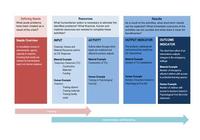Resources
Request support on coordination, information management, capacity development or other education in emergencies areas.
Demande de soutien en coordination, gestion de l’information, développement des capacités et autres domaines de l'éducation en situation d'urgence.
لطلب الدعم في مجال التنسيق ، إدارة المعلومات ، تنمية القدرات أو في اي مجال من مجالات التعليم في مناطق الطوارئ
Solicitar apoyo en coordinación, gestión de la información, desarrollo de capacidades u otra áreas en educación en emergencias.
Featured Resources
below you can find selected tools

COVID-19 Resources
View resources to support education in emergencies coordination during the COVID-19 pandemic.

Guidance on Education Cluster Co-Leadership Arrangements at the Country Level
Indicative Guidance for the establishment and management of co-leadership arrangements at the country level.

Inter-agency Network for Education in Emergencies
For technical education in emergencies resources, please visit the INEE website.
Guide to Education in Emergencies Needs Assessments
The purpose of the Guide and Needs Assessment Packages to provide practical, relevant guidance and resources to education in emergencies (EiE) coordination staff conducting, coordinating and participating in secondary data reviews and joint, harmonized and/or multi-sector needs assessments.
- Coordination: Needs Assessment, Inter-Sector Coordination
- HPC: Needs Assessment & Analysis
- Technical Areas: Accountability to Affected Populaiton, Localisation
Education Cluster Assessment Framework Template
Key decisions, deadlines and information needs should be recorded into an assessment framework. The framework is a guiding document for the entire assessment process and helps ensure that data for every question has a specific purpose for being collected (as well as a plan for how to analyze it…
- Coordination: Needs Assessment
- HPC: Needs Assessment & Analysis
Reference Module for the Implementation of the Humanitarian Programme Cycle
The IASC Reference Module for the Implementation of the Humanitarian Program Cycle defines the roles and responsibilities of international humanitarian actors and the way that they interact with each other, national and local authorities, civil society and with people affected by crises. This…
- Coordination: Coordination
- HPC: Implementation & Monitoring, Needs Assessment & Analysis, Operational Peer Review and Evaluation, Resource Mobilisation, Strategic Planning
- Technical Areas: Accountability to Affected Populaiton
Module de Référence pour la Coordination Sectorielle au niveau national
Ce Module de Référence décrit les principaux éléments de la coordination sectorielle et a été élaboré comme outil de référence pour les intervenants afin de soutenir leurs activités et d'améliorer l'efficacité de la réponse humanitaire.
- Coordination: Coordination, Cluster Management, Leadership
- HPC: Implementation & Monitoring, Needs Assessment & Analysis, Operational Peer Review and Evaluation, Resource Mobilisation, Strategic Planning
MODULE DE RÉFÉRENCE DE L’IASC POUR LA MISE EN ŒUVRE DU CYCLE DE PROGRAMME HUMANITAIRE
The IASC Reference Module for the Implementation of the Humanitarian Program Cycle defines the roles and responsibilities of international humanitarian actors and the way that they interact with each other, national and local authorities, civil society and with people affected by crises. This…
- Coordination: Coordination, Cluster Strategy, Needs Assessment, Information Management
- HPC: Implementation & Monitoring, Needs Assessment & Analysis, Operational Peer Review and Evaluation, Resource Mobilisation, Strategic Planning
- Technical Areas: Accountability to Affected Populaiton
Guidance on Cluster Leadership for Save the Children Country Offices: The Benefits, the Role and the Responsibilities
As a Cluster Lead Agency (CLA), Save the Children is inherently responsible for the effective establishment, management and sustained global and national support of the Education Cluster. The following document outlines the benefits to SC as well as the responsibilities of the Country Director (CD…
- Coordination: Coordination, Cluster Management, Leadership
- HPC: Implementation & Monitoring, Needs Assessment & Analysis, Operational Peer Review and Evaluation, Resource Mobilisation, Strategic Planning
- Technical Areas: Accountability to Affected Populaiton
GIS Mapping Tools
A list of tools and software to create maps along with links to online trainings to help you get started using the tools and software.
- Coordination: Information Management
- HPC: Implementation & Monitoring, Needs Assessment & Analysis
Defining an Indicator
This document is intended to help you develop SMART indicators.
- Coordination: Needs Assessment, Information Management
- HPC: Implementation & Monitoring, Needs Assessment & Analysis, Strategic Planning
- Coordination: Coordination, Leadership
- HPC: Implementation & Monitoring, Needs Assessment & Analysis, Operational Peer Review and Evaluation, Resource Mobilisation, Strategic Planning, Coordination
Cluster Coordination Reference Module (CCRM)
This Cluster Coordination Reference Module outlines the basic elements of cluster coordination and intends to serve as a reference guide for field practitioners to help facilitate their work and improve humanitarian outcomes
- Coordination: Coordination, Cluster Management
- HPC: Implementation & Monitoring, Needs Assessment & Analysis, Operational Peer Review and Evaluation, Resource Mobilisation, Strategic Planning
Filter results
Coordination(selected )
Country(selected )
Humanitarian Programme Cycle(selected )
Language(selected )
Publication Date(selected )
Publisher(selected )
Resource Type(selected )
Technical Areas(selected )
Can’t find what you’re looking for?
Contact your relevant language Help Desk










